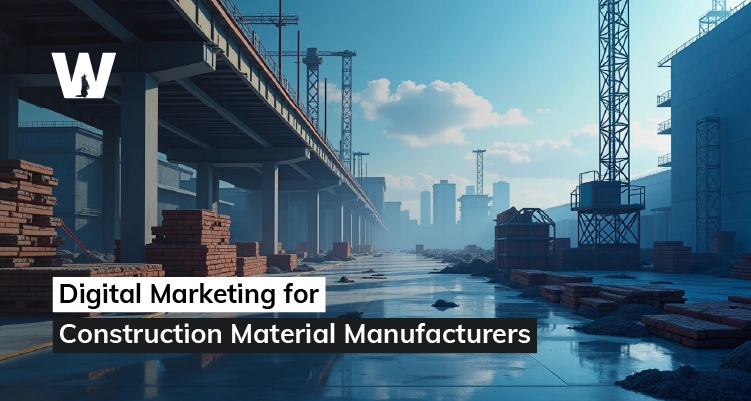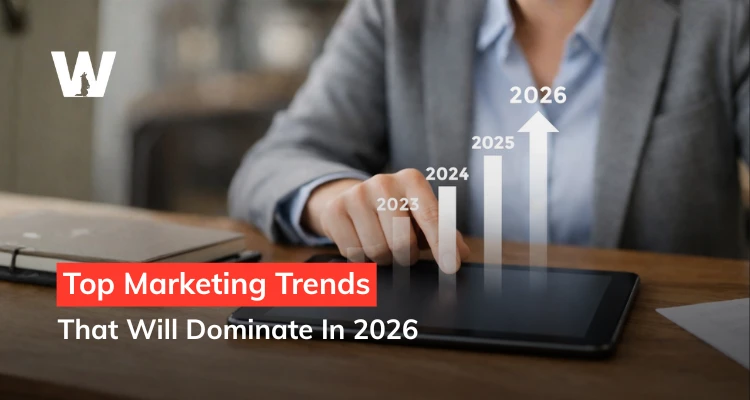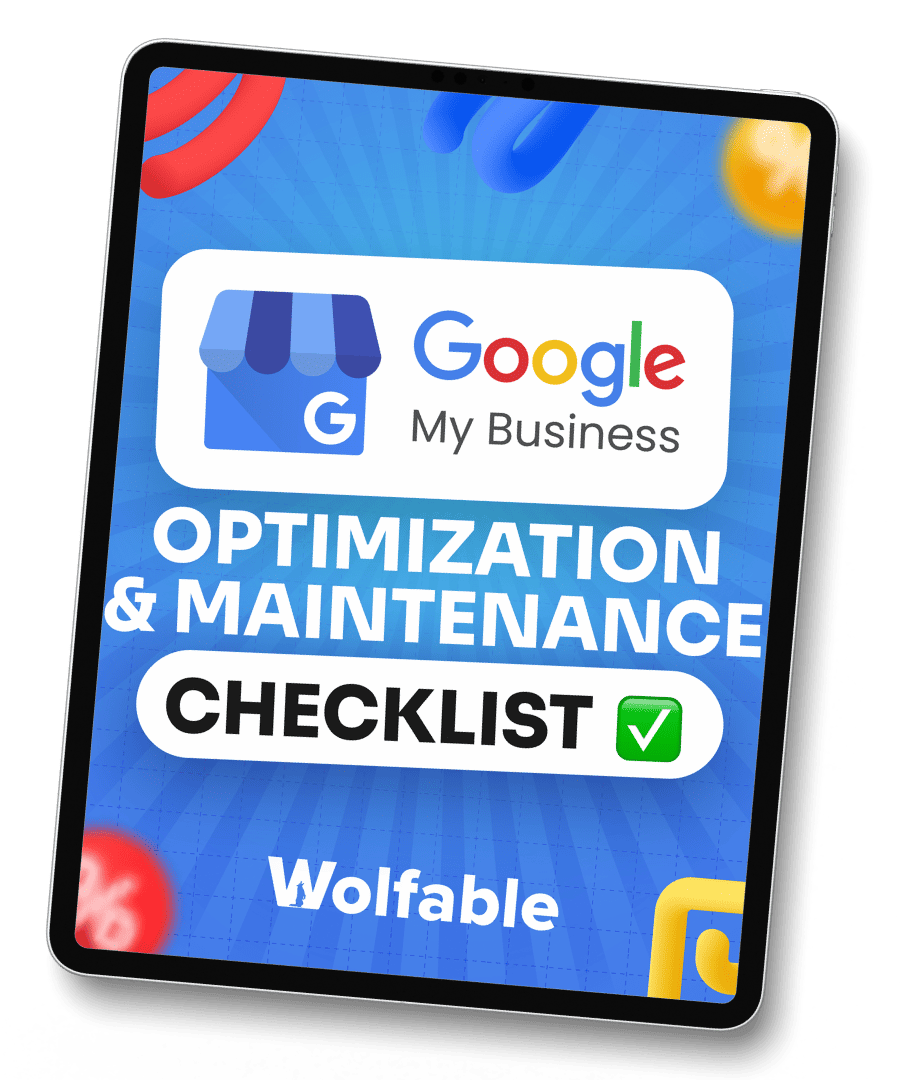Wraps up in 11 Minutes
In today's competitive landscape, construction material manufacturers face unique challenges in reaching their target audience. The days of relying solely on trade shows, print catalogs, and word-of-mouth referrals are fading into the background. Digital marketing has emerged as the cornerstone of successful marketing strategies for construction material brands looking to cement their place in the industry.
But how exactly can digital marketing transform your construction materials business? What strategies yield the best results for manufacturers of concrete, steel, timber, glass, insulation, or other building materials? And why is a solid online presence now essential rather than optional?
At Wolfable, we've helped numerous manufacturers build their digital presence from the ground up. This comprehensive guide will walk you through everything you need to know about leveraging digital marketing to increase visibility, generate qualified leads, and ultimately boost sales of your construction materials.
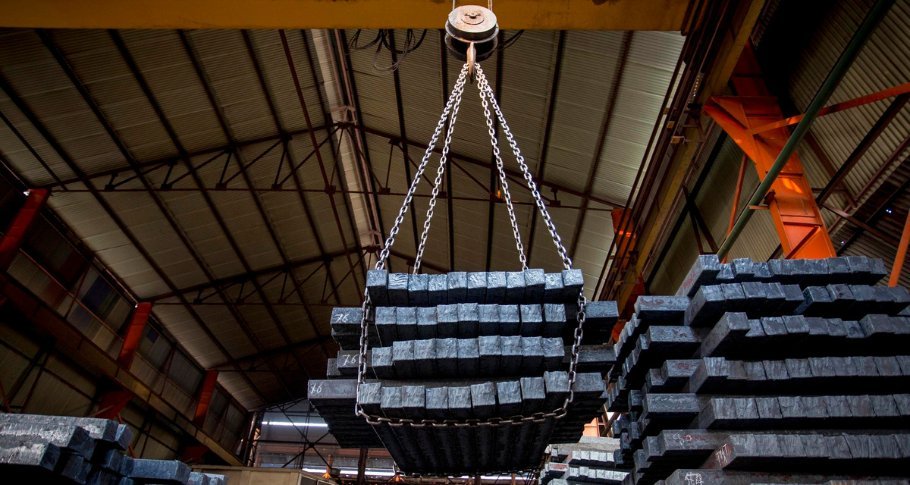
The Changing Landscape of Construction Material Marketing
How has marketing changed for building material manufacturers?
The construction industry has traditionally been slower to adopt digital transformation compared to other sectors. However, the landscape is rapidly evolving, with decision-makers increasingly turning to online resources before making purchasing decisions.
Research shows that over 70% of contractors and builders now research construction materials online before contacting suppliers. This shift in buyer behavior creates both challenges and opportunities for manufacturers who can adapt their marketing approach.
Digital channels now offer unprecedented opportunities to showcase product specifications, demonstrate applications, and highlight the unique selling points of construction materials in ways that traditional marketing simply cannot match.
Who are construction material manufacturers trying to reach online?
Understanding your audience is crucial for effective digital marketing. Construction material manufacturers typically need to reach several key stakeholders:
| Audience Segment | Digital Behavior | Marketing Approach |
|---|---|---|
| Contractors & Builders | Research products online, compare specifications | Detailed product information, comparison tools |
| Architects & Designers | Seek inspiration and technical specifications | Visual content, CAD files, specification sheets |
| Project Managers | Focus on cost efficiency and delivery timelines | ROI calculators, supply chain information |
| Procurement Teams | Compare vendors and negotiate terms | Competitive pricing, bulk order information |
| DIY Homeowners | Look for how-to guides and user-friendly materials | Educational content, installation videos |
Each of these audiences has different needs, concerns, and digital behaviors that your marketing strategy must address to be truly effective.
Why Digital Marketing Matters for Construction Material Manufacturers
What makes digital marketing essential in the construction industry?
The construction materials sector operates in a unique space where product quality, technical specifications, and reliability are paramount. Digital marketing allows manufacturers to:
- Demonstrate product performance through videos and case studies
- Provide detailed technical specifications in accessible formats
- Showcase real-world applications of materials in various projects
- Offer easy access to safety data sheets and compliance information
- Build credibility through customer testimonials and project galleries
These capabilities are particularly valuable in an industry where the wrong material choice can have serious consequences for safety, compliance, and project success.
How does digital marketing impact the bottom line for material manufacturers?
The ROI of digital marketing for construction material manufacturers goes beyond mere brand awareness:
1. Lead Generation: Targeted campaigns can attract qualified leads specifically interested in your category of construction materials.
2. Shortened Sales Cycles: By providing comprehensive product information online, you can reduce the time from initial inquiry to purchase.
3. Market Expansion: Digital presence allows you to reach new geographic markets without physical distribution networks.
4. Competitive Differentiation: In a market where products may seem similar, digital content helps highlight your unique value proposition.
5. Customer Loyalty: Regular engagement through digital channels strengthens relationships with existing customers.
According to industry reports, construction material manufacturers who invest strategically in digital marketing see an average of 23% increase in qualified leads and a 15% reduction in customer acquisition costs.
Essential Digital Marketing Strategies for Construction Material Manufacturers
1. Building a Foundation: Website Development and Optimization
What makes an effective website for construction material manufacturers?
Your website serves as the digital headquarters for your brand. For construction material manufacturers, an effective website must balance technical information with user-friendly navigation.
Key elements of an effective construction material website include:
- Intuitive product categorization based on application or material type
- Detailed product specifications with downloadable technical data sheets
- Project galleries showcasing real-world applications of your materials
- Easy-to-find compliance and certification information
- Simple quote request or sample ordering functionality
- Mobile responsiveness for on-site access by contractors
The architecture of your website should mirror how your customers think about and search for your products. This means organizing content by both material categories and application types to facilitate easy navigation.
How can construction material websites be optimized for conversion?
Beyond simply providing information, your website should be designed to convert visitors into leads or customers. Effective conversion strategies include:
- Prominently displayed contact information for sales inquiries
- Strategic placement of call-to-action buttons for sample requests
- Gated technical resources that capture visitor information
- Live chat functionality for immediate assistance with technical questions
- Simplified quote request forms with minimal required fields
- Locator tools to find nearby distributors or representatives
A well-optimized website becomes your most valuable sales representative, working 24/7 to inform prospects and capture leads.
2. Being Found: Search Engine Optimization for Construction Materials
Which SEO strategies work best for construction material manufacturers?
Construction material manufacturers face unique SEO challenges and opportunities. The technical nature of the industry means that search terms are often specific and have high purchase intent.
Effective SEO strategies for construction material manufacturers include:
- Targeting specific long-tail keywords related to material specifications
- Creating dedicated pages for different application scenarios
- Optimizing for local search to reach regional contractors and builders
- Developing technical content that answers common questions about materials
- Building backlinks from industry associations and trade publications
- Implementing schema markup for product specifications
Research shows that 93% of online experiences begin with a search engine, making SEO a critical component of your digital marketing strategy.
What content should construction material manufacturers create for SEO?
Content development for construction material SEO should focus on addressing the specific questions and concerns of your target audience:
1. Technical Guides: In-depth explanations of material properties and applications
2. Comparison Content: How your materials compare to alternatives in specific situations
3. Application Case Studies: Real-world examples of successful projects using your materials
4. Installation Tutorials: Step-by-step guides for proper material installation
5. Regulatory Compliance: Updates on industry standards and how your products meet them
6. Problem-Solving Content: How your materials address common construction challenges
By developing content that thoroughly answers the questions your potential customers are asking, you not only improve your search rankings but also establish your brand as an authority in the construction materials space.
3. Showcasing Materials: Content Marketing Strategies
How can content marketing highlight construction material qualities?
The visual and technical nature of construction materials makes them ideal candidates for rich content marketing. Effective content types include:
- Technical White Papers: Detailed explorations of material performance in specific conditions
- Video Demonstrations: Visual proof of material properties like strength, flexibility, or fire resistance
- Infographics: Visual comparisons of different material options and their benefits
- Case Study Portfolios: Collections of successful projects organized by application type
- Material Selection Guides: Decision-making tools for choosing the right materials for specific projects
Content marketing for construction materials requires a balance between technical accuracy and accessibility. The best content translates complex specifications into clear benefits for the end-user.
What content formats engage construction industry professionals?
Different content formats appeal to different segments of your audience:
| Content Format | Primary Audience | Engagement Value |
|---|---|---|
| Technical Data Sheets | Engineers, Specifiers | High reference value, frequently downloaded |
| Application Videos | Contractors, Installers | Demonstrates practical use, builds confidence |
| Project Galleries | Architects, Designers | Showcases aesthetic possibilities and applications |
| ROI Calculators | Project Managers, Estimators | Helps justify purchase decisions with data |
| Blog Articles | General Construction Audience | Builds awareness and drives organic traffic |
| Webinars | Professional Development Seekers | Positions brand as thought leader, captures leads |
By diversifying your content formats, you can engage different stakeholders throughout their decision-making journey.
4. Building Relationships: Social Media Marketing for Construction Materials
Which social media platforms work best for construction material manufacturers?
Not all social platforms are equally effective for construction material marketing. Focus your efforts on channels where your professional audience spends their time:
1. LinkedIn: Ideal for reaching architects, engineers, and corporate decision-makers with technical content and industry insights.
2. Instagram: Perfect for showcasing visual aspects of your materials in finished projects through high-quality photography.
3. YouTube: Essential for hosting detailed product demonstrations, installation tutorials, and project case studies.
4. Pinterest: Increasingly important for reaching architects and designers looking for material inspiration and applications.
5. Twitter: Valuable for industry news, product announcements, and engaging with industry influencers and publications.
Each platform requires a customized approach that aligns with both the platform's strengths and your marketing objectives.
What type of social content engages the construction industry?
Construction professionals respond best to social content that offers clear value:
- Before-and-after project transformations
- Time-lapse videos of installations using your materials
- Technical tips that solve common application problems
- Spotlight features on innovative uses of your materials
- Behind-the-scenes looks at your manufacturing process
- Customer success stories with tangible outcomes
Remember that social media success in the construction materials sector isn't measured by viral reach but by engaging the right professional audience who influence material purchasing decisions.
5. Nurturing Leads: Email Marketing for Construction Material Manufacturers
How can email marketing drive construction material sales?
Email remains one of the most effective channels for nurturing leads in the construction materials industry. Strategic approaches include:
- Segmented newsletters targeting different audience types (contractors vs. architects)
- New product announcement campaigns with technical specifications
- Educational series explaining best practices for material application
- Case study spotlights demonstrating successful project implementations
- Exclusive early access to new technical resources or tools
- Personalized follow-ups based on website browsing behavior
With an average ROI of $42 for every $1 spent, email marketing delivers exceptional value when properly executed.
What makes construction material email campaigns effective?
Construction professionals receive numerous emails daily. To stand out:
1. Use Technical Subject Lines: Be specific about the content value (e.g., "New Data: Concrete Curing Times Reduced by 30%")
2. Keep Design Clean: Minimize distractions and focus on the key information
3. Include Visual Elements: Product images, application photos, or simple diagrams
4. Provide Clear CTAs: Make next steps obvious with prominent buttons
5. Optimize for Mobile: Ensure readability on job site devices
6. Segment Carefully: Tailor content to specific roles and interests
By delivering relevant, valuable information directly to interested prospects, email marketing helps move them through your sales funnel efficiently.
6. Driving Targeted Traffic: PPC and Display Advertising
How should construction material manufacturers approach paid advertising?
Pay-per-click (PPC) and display advertising require a strategic approach in the construction materials sector:
- Target Specific Terms: Focus on high-intent keywords that indicate active purchasing research
- Geotarget Campaigns: Align advertising with your distribution capabilities and target markets
- Use Remarketing: Re-engage visitors who viewed specific product categories
- Leverage Customer Match: Target ads to your existing customer and prospect lists
- Create Specific Landing Pages: Develop dedicated pages that align perfectly with ad messaging
With the right approach, paid advertising can generate immediate visibility and leads while your organic strategies build momentum.
What ad formats work best for construction materials?
Different ad formats serve different marketing objectives:
| Ad Format | Best Use Case | Key Considerations |
|---|---|---|
| Search Ads | Capturing active research | Focus on technical specifications and benefits |
| Display Ads | Building brand awareness | Strong visuals of materials in application |
| Video Ads | Demonstrating performance | Short, impactful demonstrations of key features |
| Social Ads | Reaching specific professionals | Precise targeting by job title and industry |
| Remarketing | Converting interested prospects | Specific offers based on previously viewed products |
The most successful construction material advertisers adopt a multi-format approach that engages prospects at different stages of their decision-making process.
7. Showing, Not Telling: Video Marketing for Construction Materials
Why is video essential for marketing construction materials?
The physical properties of construction materials make them ideal candidates for video marketing:
- Demonstrations of strength, durability, and performance
- Installation tutorials showing proper application techniques
- Comparison tests between your materials and competitors
- Time-lapse videos showing long-term performance
- Customer testimonials from completed projects
- Manufacturing process highlights showcasing quality control
Video content not only improves engagement but also significantly increases retention of technical information.
What types of videos should construction material manufacturers create?
A comprehensive video strategy includes multiple content types:
1. Product Showcases: Highlighting key features and benefits of specific materials
2. Application Tutorials: Step-by-step guidance on proper installation techniques
3. Case Studies: Visual stories of successful projects using your materials
4. Technical Explanations: Breaking down complex specifications into understandable concepts
5. Comparison Demonstrations: Side-by-side testing against alternative materials
6. Webinar Recordings: In-depth discussions of industry challenges and solutions
Videos should be created with specific platforms and purposes in mind, from detailed YouTube tutorials to shorter social media clips highlighting key benefits.
8. Future-Forward Marketing: AI and AR/VR Applications
How are AI solutions transforming construction material marketing?
Artificial intelligence is opening new opportunities for construction material marketers:
- Chatbots: Providing immediate answers to technical questions 24/7
- Predictive Lead Scoring: Identifying which prospects are most likely to convert
- Content Personalization: Dynamically adjusting website content based on visitor behavior
- Material Recommendation Engines: Suggesting optimal materials based on project parameters
- Voice Search Optimization: Adapting content for voice-based material searches
- Predictive Analytics: Forecasting material needs based on market trends
These AI applications help construction material manufacturers deliver more relevant information to prospects while operating more efficiently.
What role do AR and VR play in construction material marketing?
Augmented and virtual reality technologies offer particularly valuable applications for construction materials:
1. Virtual Material Visualization: Allowing architects to see how materials will look in finished projects
2. AR Installation Guides: Providing on-site visual guidance for proper material application
3. Virtual Showrooms: Creating immersive digital experiences to explore material options
4. Interactive Specification Tools: Enabling dynamic exploration of material properties
5. VR Training: Offering installation training without physical material samples
These technologies bridge the gap between digital marketing and physical products, creating compelling experiences that drive specification and purchase decisions.
Maximize Growth with Digital Marketing for Construction Material Manufacturers
Creating Your Construction Material Digital Marketing Strategy
How to develop an effective digital marketing plan
1. Situation Analysis
- Assess your current digital presence and performance
- Analyze competitor digital strategies and market positioning
- Identify key differentiators and unique selling propositions
- Evaluate industry trends and digital adoption patterns
2. Audience Definition
- Develop detailed personas for each stakeholder group
- Map the digital journey for each persona type
- Identify key questions and concerns at each stage
- Determine preferred channels and content formats
3. Goal Setting
- Establish specific, measurable marketing objectives
- Align digital goals with broader business objectives
- Set realistic timelines for implementation and results
- Create KPIs for tracking performance
4. Channel Strategy
- Select primary and secondary marketing channels
- Allocate budget based on channel effectiveness
- Develop channel-specific content approaches
- Create an integrated cross-channel experience
5. Content Planning
- Develop a content calendar aligned with industry cycles
- Balance technical, educational, and promotional content
- Assign internal and external content creation resources
- Establish quality control processes for technical accuracy
6. Implementation Plan
- Create detailed execution timelines
- Assign responsibilities to team members
- Establish approval workflows for technical content
- Develop contingency plans for changing market conditions
7. Measurement Framework
- Implement analytics tracking across all channels
- Create regular reporting cadence
- Establish thresholds for strategy adjustments
- Develop attribution models for lead generation
A methodical approach ensures that your digital marketing efforts are strategic rather than reactive, maximizing the return on your marketing investment.
Measuring Success: Key Metrics for Construction Material Marketing
Digital marketing success for construction materials manufacturers should be measured against specific industry-relevant metrics:
| Metric Category | Key Indicators | Why They Matter |
|---|---|---|
| Website Performance | Technical page engagement, specification downloads | Shows interest in specific materials |
| Lead Generation | Sample requests, quote inquiries, distributor locator usage | Indicates purchase intent |
| Content Engagement | Case study views, technical video completion rates | Reflects quality of educational content |
| Social Media | Engagement from professional audiences, shares by industry influencers | Indicates industry relevance |
| Email Marketing | Open rates by segment, technical content click-throughs | Shows message relevance to audience |
| Search Performance | Rankings for technical terms, specification-based queries | Reflects findability when customers need you |
These metrics should be tracked consistently and analyzed in the context of sales data to understand the true impact of your digital marketing efforts.
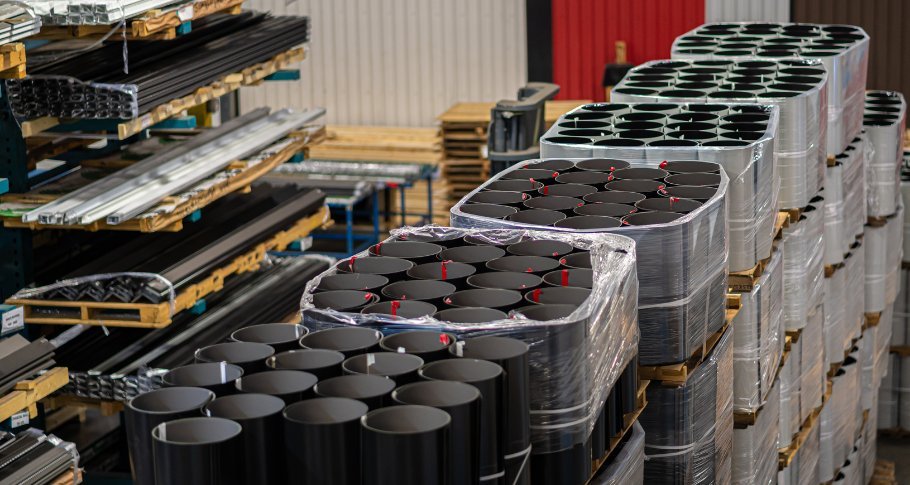
The Future of Digital Marketing for Construction Material Manufacturers
The digital marketing landscape for construction materials continues to evolve. Forward-thinking manufacturers should monitor these emerging trends:
1. Digital Material Libraries: Integration with architectural design software for direct specification
2. Environmental Impact Calculators: Interactive tools demonstrating sustainability metrics
3. Supply Chain Transparency: Digital tracking and communication of material sourcing and delivery
4. Personalized Specification Guides: AI-driven content customized to specific project requirements
5. Virtual Material Testing: Simulated performance demonstrations for specific applications
6. Blockchain for Certification: Digital verification of material quality and regulatory compliance
7. Voice-Activated Technical Support: Voice interface access to installation and application guidance
By staying ahead of these trends, construction material manufacturers can maintain a competitive advantage in an increasingly digital marketplace.
Preparing Your Digital Marketing for Future Growth
To position your construction materials business for sustained digital marketing success:
- Invest in modular content that can be repurposed across emerging platforms
- Build first-party data assets to reduce reliance on third-party targeting
- Develop technical expertise that bridges marketing and product engineering
- Create measurement frameworks that connect marketing activities to sales outcomes
- Establish ongoing market listening to detect shifting customer preferences
- Allocate resources for experimental marketing in emerging channels
A forward-looking approach ensures that your digital marketing remains effective as technology and buyer behaviors continue to evolve.
Why Choose Wolfable for Construction Material Digital Marketing
Our Unique Approach to Construction Material Marketing
At Wolfable, we bring a specialized approach to the manufacturing sector:
1. Technical Understanding: Our team includes marketers with backgrounds in engineering, ensuring accurate communication of complex material properties.
2. Multi-Stakeholder Strategies: We develop integrated approaches that address the needs of all decision-makers in the specification and purchasing process.
3. Data-Driven Optimization: We continuously refine campaigns based on performance metrics tied directly to your sales objectives.
4. Channel Integration: Our strategies create seamless experiences across digital touchpoints, from technical SEO to social media.
Since 2016, we have helped manufacturers to deliver marketing that drives real business results.

Conclusion
In today's construction materials market, a strategic digital presence is no longer optional—it's fundamental to business success. From technical SEO to immersive AR experiences, digital marketing offers unprecedented opportunities to showcase material properties, educate customers, and generate qualified leads.
At Wolfable, we're committed to helping manufacturers navigate the digital landscape with confidence. Our blend of technical understanding and marketing expertise enables us to create strategies that connect with decision-makers and drive specification, purchase, and loyalty.
Ready to strengthen your digital foundation? Contact Wolfable today to discuss how our specialized approach to construction material marketing can help your business reach new heights.


